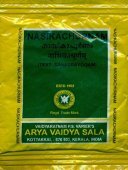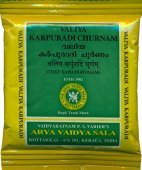Amaya, Āmaya, Amāya, Āmāya: 22 definitions
Introduction:
Amaya means something in Buddhism, Pali, Hinduism, Sanskrit, Jainism, Prakrit, Marathi, biology. If you want to know the exact meaning, history, etymology or English translation of this term then check out the descriptions on this page. Add your comment or reference to a book if you want to contribute to this summary article.
In Hinduism
Ayurveda (science of life)
Kalpa (Formulas, Drug prescriptions and other Medicinal preparations)
Source: Shodhganga: Edition translation and critical study of yogasarasamgrahaĀmaya (आमय) is another name for “Kuṣṭha” and is dealt with in the 15th-century Yogasārasaṅgraha (Yogasara-saṅgraha) by Vāsudeva: an unpublished Keralite work representing an Ayurvedic compendium of medicinal recipes. The Yogasārasaṃgraha [mentioning āmaya] deals with entire recipes in the route of administration, and thus deals with the knowledge of pharmacy (bhaiṣajya-kalpanā) which is a branch of pharmacology (dravyaguṇa).

Āyurveda (आयुर्वेद, ayurveda) is a branch of Indian science dealing with medicine, herbalism, taxology, anatomy, surgery, alchemy and related topics. Traditional practice of Āyurveda in ancient India dates back to at least the first millenium BC. Literature is commonly written in Sanskrit using various poetic metres.
Shaktism (Shakta philosophy)
Source: Google Books: ManthanabhairavatantramĀmaya (आमय) refers to “defects”, according to the Manthānabhairavatantra, a vast sprawling work that belongs to a corpus of Tantric texts concerned with the worship of the goddess Kubjikā.—Accordingly, “The Khañjinīmata consisting of 1,000 million (verses) [i.e., śatakoṭi] has been uttered . In this way, Śāmbhavīśakti that has no end has become infinite. Śāmbhava, Śākta, and Āṇava have come about by her impulse. She abides (thus) in the three worlds as will, knowledge and action. Bhairava, tranquil and free of defects [i.e., vigata-āmaya], resides above Meru. He is rich with the jewels of countless qualities and is encompassed by millions of Rudras”.

Shakta (शाक्त, śākta) or Shaktism (śāktism) represents a tradition of Hinduism where the Goddess (Devi) is revered and worshipped. Shakta literature includes a range of scriptures, including various Agamas and Tantras, although its roots may be traced back to the Vedas.
Jyotisha (astronomy and astrology)
Source: Wisdom Library: Brihat Samhita by VarahamihiraĀmaya (आमय) refers to “disease”, according to the Bṛhatsaṃhitā (chapter 4), an encyclopedic Sanskrit work written by Varāhamihira mainly focusing on the science of ancient Indian astronomy astronomy (Jyotiṣa).—Accordingly, “If the lunar disc be of ashy colour, of sharp rays or red, or rayless, or red black, or appear broken there will be fear of hunger, of war, of disease [i.e., āmaya] and of robbers. If the lunar disc should appear white and of the colour of the snow, of Kunda, of Kumuda and of crystal he brings prosperity on the land”.

Jyotisha (ज्योतिष, jyotiṣa or jyotish) refers to ‘astronomy’ or “Vedic astrology” and represents the fifth of the six Vedangas (additional sciences to be studied along with the Vedas). Jyotisha concerns itself with the study and prediction of the movements of celestial bodies, in order to calculate the auspicious time for rituals and ceremonies.
Pancaratra (worship of Nārāyaṇa)
Source: University of Vienna: Sudarśana's Worship at the Royal Court According to the AhirbudhnyasaṃhitāĀmaya (आमय) refers to an “illness”, according to the Ahirbudhnyasaṃhitā, belonging to the Pāñcarātra tradition which deals with theology, rituals, iconography, narrative mythology and others.—Accordingly, “An abnormal modification caused by a aggressive ritual against Kings, occurring at the improper time, dreadful and all-reaching, is characterized by the these signs: Suddenly horses, elephants and ministers perish, the king himself suffers from a serious illness (tīvra-āmaya) which has seized [his] body; terrifying thunderbolts strike his dominion; [...] from such and other signs he should understand that the enemy is performing a aggressive ritual”.

Pancaratra (पाञ्चरात्र, pāñcarātra) represents a tradition of Hinduism where Narayana is revered and worshipped. Closeley related to Vaishnavism, the Pancaratra literature includes various Agamas and tantras incorporating many Vaishnava philosophies.
Sports, Arts and Entertainment (wordly enjoyments)
Source: archive.org: Syainika Sastra of Rudradeva with English Translation (art)Āmaya (आमय) refers to “diseases” (such as indigestion), according to the Śyainika-śāstra: a Sanskrit treatise dealing with the divisions and benefits of Hunting and Hawking, written by Rājā Rudradeva (or Candradeva) in possibly the 13th century.—Accordingly, “[...] If hunting is to be altogether prohibited, how can meat, skin, horn and other articles prescribed for sacrifices be obtained? Similarly, by sleeping in the day time, the corporeal body, which is the means for attaining the three great objects of life, is preserved from such diseases (āmaya) as indigestion, and so on. [...]”.

This section covers the skills and profiencies of the Kalas (“performing arts”) and Shastras (“sciences”) involving ancient Indian traditions of sports, games, arts, entertainment, love-making and other means of wordly enjoyments. Traditionally these topics were dealt with in Sanskrit treatises explaing the philosophy and the justification of enjoying the pleasures of the senses.
In Buddhism
Mahayana (major branch of Buddhism)
Source: academia.edu: A Study and Translation of the GaganagañjaparipṛcchāAmāyā (अमाया) refers to the “absence of deception”, according to the Gaganagañjaparipṛcchā: the eighth chapter of the Mahāsaṃnipāta (a collection of Mahāyāna Buddhist Sūtras).—Accordingly, “Ratnapāṇi said: ‘Son of good family, what are those four dharmas included in?’ Gaganagañja said: ‘Son of good family, these four dharmas are included in eight dharmas. What are the eight? To wit, (1) the absence of fraud is included in honest and clarity; (2) the absence of deception (amāyā) is included in the absence of not artificial and pure intention; (3) non-attachment to anything in particular is included in the unsullied thought and the undiminished vigour; (4) going to a different state is included in the collection of merits and the collection of knowledge’”.

Mahayana (महायान, mahāyāna) is a major branch of Buddhism focusing on the path of a Bodhisattva (spiritual aspirants/ enlightened beings). Extant literature is vast and primarely composed in the Sanskrit language. There are many sūtras of which some of the earliest are the various Prajñāpāramitā sūtras.
In Jainism
General definition (in Jainism)
Source: The University of Sydney: A study of the Twelve ReflectionsĀmaya (आमय) refers to “diseases”, according to the 11th century Jñānārṇava, a treatise on Jain Yoga in roughly 2200 Sanskrit verses composed by Śubhacandra.—Accordingly, “Is one not disturbed by [family] attachments? Is this body not cut down by diseases (āmaya—vapur idaṃ kiṃ chidyate nāmayair)? Does death not open its mouth? Do calamities not do harm every day? Are hells not dreadful? Are not sensual pleasures deceiving like a dream? Because of which, having discarded one’s own benefit, you have a desire for the world which is like a city of Kiṃnaras”.
Synonyms: Rujā, Roga.

Jainism is an Indian religion of Dharma whose doctrine revolves around harmlessness (ahimsa) towards every living being. The two major branches (Digambara and Svetambara) of Jainism stimulate self-control (or, shramana, ‘self-reliance’) and spiritual development through a path of peace for the soul to progess to the ultimate goal.
Biology (plants and animals)
Source: Google Books: CRC World Dictionary (Regional names)Amaya in India is the name of a plant defined with Saussurea costus in various botanical sources. This page contains potential references in Ayurveda, modern medicine, and other folk traditions or local practices It has the synonym Aplotaxis lappa Decaisne (among others).
Example references for further research on medicinal uses or toxicity (see latin names for full list):
· Dict. Sci. Nat. (1827)
· Compositae Indicae (1876)
· Repertorium Botanices Systematicae (1843)
· Linnaea (1846)
· CIS Chromosome Inform. Serv. (1993)
· Transactions of the Linnean Society of (1845)
If you are looking for specific details regarding Amaya, for example health benefits, extract dosage, side effects, diet and recipes, pregnancy safety, chemical composition, have a look at these references.

This sections includes definitions from the five kingdoms of living things: Animals, Plants, Fungi, Protists and Monera. It will include both the official binomial nomenclature (scientific names usually in Latin) as well as regional spellings and variants.
Languages of India and abroad
Pali-English dictionary
Source: BuddhaSasana: Concise Pali-English Dictionaryāmaya : (nt.) illness.
Source: Sutta: The Pali Text Society's Pali-English DictionaryAmāya, (adj.) (a + māyā) not deceiving, open, honest Sn.941 (see Nd1 422: māyā vuccati vañcanikā cariyā). Cp. next. (Page 73)
— or —
Āmaya, (etym.? cp. Sk. āmaya) affliction, illness, misery; only as an° (adj.) not afflicted, not decaying, healthy, well (cp. BSk. nirāmaya Aśvaghoṣa II.9) Vin.I, 294; Vv 1510 (= aroga VvA.74); 177; 368; J.III, 260, 528; IV, 427; VI, 23. Positive only very late, e. g. Sdhp.397. (Page 104)
— or —
Āmāya, (adj.) (to be considered either a der. from amā (see amājāta in same meaning) or to be spelt amāya which metri causa may be written ā°) “born in the house” (cp. semantically Gr. i)qagenήs › indigenous), inborn, being by birth, in cpd. °dāsa (dāsī) a born slave, a slave by birth J.VI, 117 (= gehadāsiyā kucchismiṃ jātadasī C.), 285 (= dāsassa dāsiyā kucchimhi jātadāsā). (Page 104)

Pali is the language of the Tipiṭaka, which is the sacred canon of Theravāda Buddhism and contains much of the Buddha’s speech. Closeley related to Sanskrit, both languages are used interchangeably between religions.
Marathi-English dictionary
Source: DDSA: The Molesworth Marathi and English Dictionaryāmaya (आमय).—m S Disease or disorder, sickness, illness.
Marathi is an Indo-European language having over 70 million native speakers people in (predominantly) Maharashtra India. Marathi, like many other Indo-Aryan languages, evolved from early forms of Prakrit, which itself is a subset of Sanskrit, one of the most ancient languages of the world.
Sanskrit dictionary
Source: DDSA: The practical Sanskrit-English dictionaryAmāya (अमाय).—a.
1) Not cunning or sagacious, guileless, sincere, honest.
2) Immeasurable.
-yā 1 Absence of fraud or deceit, honesty, sincerity.
2) (In Vedānta Phil.) Absence of delusion or error, knowledge of the supreme truth.
-yam The Supreme Spirit (brahma).
--- OR ---
Āmaya (आमय).—[ā-mī karaṇe ac; Tv.; said to be fr. am also the word may also be derived as āmena ayyate iti āmayaḥ]
1) Disease, sickness, distemper; दुःखशोकामयप्रदाः (duḥkhaśokāmayapradāḥ) Bhagavadgītā (Bombay) 17.9; दर्पामयः (darpāmayaḥ) Mv.4.22; आमयस्तु रतिरागसंभवः (āmayastu ratirāgasaṃbhavaḥ) R.19.48; समौ हि शिष्टैराम्नातौ वर्त्स्यन्तावामयः स च (samau hi śiṣṭairāmnātau vartsyantāvāmayaḥ sa ca) Śiśupālavadha 2.1.
2) Damage, hurt, distruction; देवानामिव सैन्यानि सङ्ग्रामे तारकामये (devānāmiva sainyāni saṅgrāme tārakāmaye) Rām.6.4.54.
3) Indigestion.
-yam Name of the medical plant Costus Speciosus.
Derivable forms: āmayaḥ (आमयः).
Source: Cologne Digital Sanskrit Dictionaries: Shabda-Sagara Sanskrit-English DictionaryAmāya (अमाय).—mfn.
(-yaḥ-yā-yaṃ) 1. True, wise. 2. Sincere, guileless, free from error or deceit. f.
(-yā) 1. Absence of delusion, knowledge of the truth. 2. Sincerity, honesty. E. a neg. māyā deceit, delusion.
--- OR ---
Āmaya (आमय).—m.
(-yaḥ) Sickness, disease. n.
(-yaṃ) A grass, (Costus.) E. am to be sick, ghañ affix, āma, and ya, from yā to obtain.
Source: Cologne Digital Sanskrit Dictionaries: Benfey Sanskrit-English DictionaryĀmaya (आमय).—i. e. am, [Causal.] + a (anomal.), m. Sickness, [Rājataraṅgiṇī] 5, 209.
--- OR ---
Amāya (अमाय).—f. honesty, truth, [Hitopadeśa] ii. [distich] 33.
Amāya is a Sanskrit compound consisting of the terms a and māya (माय).
Source: Cologne Digital Sanskrit Dictionaries: Cappeller Sanskrit-English DictionaryAmāya (अमाय).—[adjective] not clever, unwise.
--- OR ---
Amāyā (अमाया).—[feminine] no deceit or guile; [instrumental] without guile.
--- OR ---
Āmaya (आमय).—[masculine] hurt, disease.
Source: Cologne Digital Sanskrit Dictionaries: Monier-Williams Sanskrit-English Dictionary1) Amāya (अमाय):—[=a-māya] mfn. not cunning, not sagacious, [Śatapatha-brāhmaṇa; Aitareya-brāhmaṇa]
2) [v.s. ...] free from deceit, guileless, [Bhaṭṭi-kāvya]
3) Amāyā (अमाया):—[=a-māyā] [from a-māya] f. absence of delusion or deceit or guile
4) Āmaya (आमय):—[from āma] m. sickness, disease, [Śatapatha-brāhmaṇa; Kātyāyana-śrauta-sūtra; Yājñavalkya; Rāmāyaṇa] etc.
5) [v.s. ...] indigestion, [cf. Lexicographers, esp. such as amarasiṃha, halāyudha, hemacandra, etc.]
6) [v.s. ...] n. the medicinal plant Costus Speciosus, [Bhāvaprakāśa]
Source: Cologne Digital Sanskrit Dictionaries: Yates Sanskrit-English Dictionary1) Amāya (अमाय):—[a-māya] (yaḥ-yā-yaṃ) a. Sincere, without guile. Also amāyika, amāyin.
2) Amaya (अमय):—[ama+ya] (yaḥ-yā-yaṃ) a. Watery.
3) Āmaya (आमय):—(yaḥ) 1. m. Sickness.
4) Amāyā (अमाया):—[a-māyā] (yā) 1. f. Sincerity.
Source: DDSA: Paia-sadda-mahannavo; a comprehensive Prakrit Hindi dictionary (S)Amaya (अमय) in the Sanskrit language is related to the Prakrit words: Amaya, Amāya, Āmaya.
[Sanskrit to German]
Sanskrit, also spelled संस्कृतम् (saṃskṛtam), is an ancient language of India commonly seen as the grandmother of the Indo-European language family (even English!). Closely allied with Prakrit and Pali, Sanskrit is more exhaustive in both grammar and terms and has the most extensive collection of literature in the world, greatly surpassing its sister-languages Greek and Latin.
Prakrit-English dictionary
Source: DDSA: Paia-sadda-mahannavo; a comprehensive Prakrit Hindi dictionary1) Amaya (अमय) in the Prakrit language is related to the Sanskrit word: Amaya.
2) Amaya (अमय) also relates to the Sanskrit word: Amṛta.
3) Amāya (अमाय) also relates to the Sanskrit word: Amāta.
4) Amāya (अमाय) also relates to the Sanskrit word: Amāya.
5) Āmaya (आमय) also relates to the Sanskrit word: Āmaya.
6) Āmaya (आमय) also relates to the Sanskrit word: Āmata.
Prakrit is an ancient language closely associated with both Pali and Sanskrit. Jain literature is often composed in this language or sub-dialects, such as the Agamas and their commentaries which are written in Ardhamagadhi and Maharashtri Prakrit. The earliest extant texts can be dated to as early as the 4th century BCE although core portions might be older.
Kannada-English dictionary
Source: Alar: Kannada-English corpusĀmaya (ಆಮಯ):—
1) [noun] want of health; any departure from health; illness; disease.
2) [noun] (dance.) one of the minor sentiments.
3) [noun] the plant Costus speciosus of Zingibberaceae family.
Kannada is a Dravidian language (as opposed to the Indo-European language family) mainly spoken in the southwestern region of India.
See also (Relevant definitions)
Starts with: Amayabhaya, Amayadhvamsa, Amayaghadia, Amayaka, Amayakate, Amayamamdira, Amayaniggama, Amayant, Amayarti, Amayavalli, Amayavin, Amayavitva, Amayavya, Amayaya.
Ends with (+901): Abhisamaya, Abhramaya, Abhyastamaya, Acaramaya, Adarshamaya, Adharmamaya, Adhvaramaya, Adrisaramaya, Agama-samaya, Agamasamaya, Agamaya, Aghamaya, Aharamaya, Aharshamaya, Ahigamaya, Akamaya, Akashamaya, Akkharasamaya, Akrodhamaya, Akshatamaya.
Full-text (+52): Anamaya, Niramaya, Anilamaya, Amayavin, Niramayam, Narakamaya, Amata, Nripamaya, Netramaya, Pandvamaya, Dronyamaya, Drumamaya, Jatharamaya, Hridamaya, Ghanamaya, Palyamaya, Udaramaya, Grahamaya, Dashamaya, Akshyamaya.
Relevant text
Search found 25 books and stories containing Amaya, A-maya, A-māya, A-māyā, Āmaya, Amāya, Āmāya, Amāyā; (plurals include: Amayas, mayas, māyas, māyās, Āmayas, Amāyas, Āmāyas, Amāyās). You can also click to the full overview containing English textual excerpts. Below are direct links for the most relevant articles:
Rig Veda (translation and commentary) (by H. H. Wilson)
Rig Veda 8.20.6 < [Sukta 20]
Chaitanya Bhagavata (by Bhumipati Dāsa)
Verse 2.12.54 < [Chapter 12 - The Glories of Nityānanda]
Verse 3.9.250 < [Chapter 9 - The Glories of Advaita]
Verse 3.1.217 < [Chapter 1 - Meeting Again at the House of Śrī Advaita Ācārya]
Shrimad Bhagavad-gita (by Narayana Gosvami)
Verse 17.9 < [Chapter 17 - Śraddhā-traya-vibhāga-yoga]
Charaka Samhita and Sushruta Samhita (by Nayana Sharma)
Disease in the classical Saṃhitās < [Chapter 4]
Bhajana-Rahasya (by Srila Bhaktivinoda Thakura Mahasaya)
Text 13 < [Chapter 3 - Tṛtīya-yāma-sādhana (Pūrvāhna-kālīya-bhajana–niṣṭhā-bhajana)]
Text 9 < [Chapter 3 - Tṛtīya-yāma-sādhana (Pūrvāhna-kālīya-bhajana–niṣṭhā-bhajana)]
Text 6 < [Chapter 7 - Saptama-yāma-sādhana (Pradoṣa-kālīya-bhajana–vipralambha-prema)]
Charaka Samhita (English translation) (by Shree Gulabkunverba Ayurvedic Society)
Chapter 1 - The Pathology of Fever (jvara-nidana) < [Nidanasthana (Nidana Sthana) — Section on Pathology]
Related products




